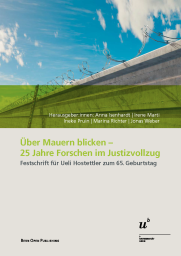Entwicklung punitiver Einstellungen in der Schweiz
Synopsis
Based on representative population surveys conducted throughout Switzerland, this article examines punitiveness as a dimension of crime-related attitudes. It explores the extent to which the population tends to favor retributive punishment over restorative punishment and to take a positive stance toward harsh punishment for those who break the rules. It focuses in particular on how these attitudes have developed between 2018 and 2024. The results show that around four in ten respondents do not categorically rule out the death penalty as a punishment. Two-thirds are in favor of a tougher stance toward criminals across the board. In addition, there was a significant increase in punitivism between 2021 and 2024. Authoritarianism and xenophobia are closely linked to punitivism. Less significant, but still having a substantial influence, was fear of crime. All three factors increased punitivism. Respondents with higher education expressed less punitivism, as did those living in cities. Respondents who live in a partnership are more punitive; men are more likely to support the death penalty than women. (machine translation)





